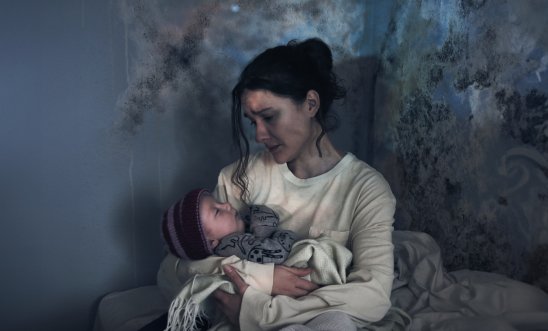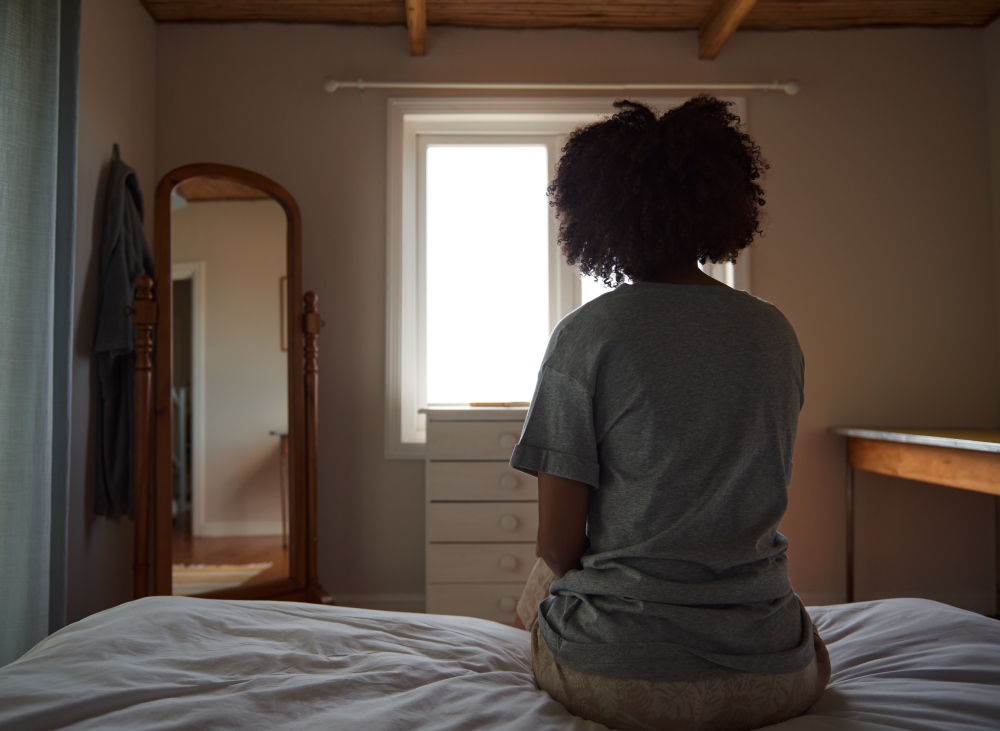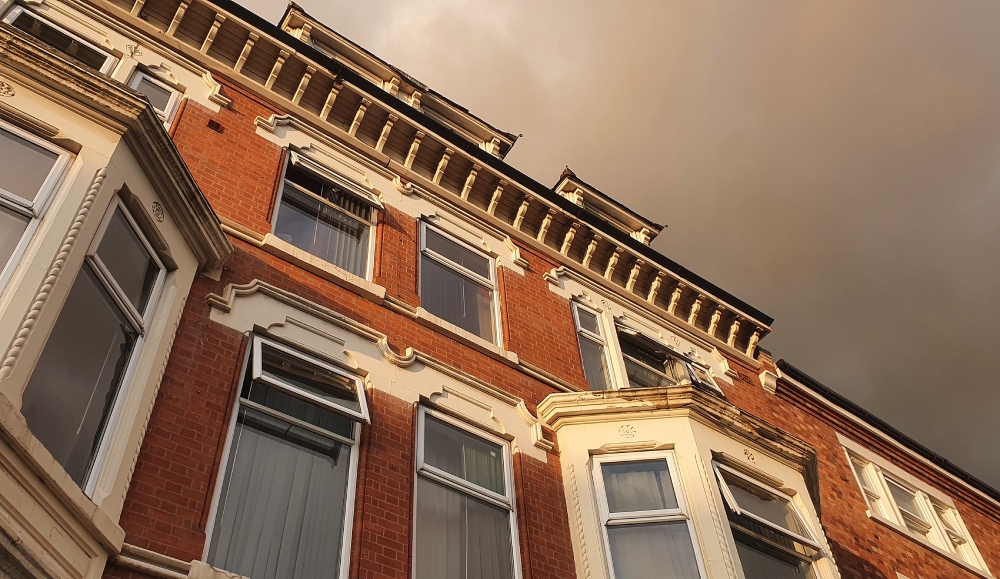
This Isn't Drama, It's Real Life

Before Our Eyes
Recently, we revealed our Before Our Eyes project, featuring Olivia Colman and Adrian Lester. The short film tells the story of Anna, a young mother who, suddenly homeless and struggling to survive, tragically watches her daughter die as a result of the shocking standard of accommodation they have been placed in. While the story is fictional, it is based on the real lives of countless people in the UK, and we consulted someone with lived experience whose story could guide the project.
The following blog is this real story of 'Charlotte Beecham', whose name has been changed to protect her identity. Charlotte is 37 years old and a mother of two. She has been homeless living in temporary accommodation since she was 18, when her mother threw her out of the family home due to a breakdown in relations. She is due to move into permanent accommodation this year.
First person: Charlotte Beecham, Birmingham
I wanted to work with Amnesty in the making of this film to show how things really are and this film shows how it is for real, for thousands of people. I have been homeless and living in temporary accommodation since I was 18. I started off in a mother and baby unit, after having my daughter in 2006. I left it for six months when I moved in with my boyfriend, but things didn’t work out after I had my son in 2009 and had to return to the unit.
When I turned 25, I was moved into a flat in a tower block and even though it was temporary, we lived there for six years.
The conditions were very bad. The flat had mould and damp, which caused my children to develop asthma and eczema. Sometimes you’d go down to the bin shoot area and see people dead in it – I saw seven people who had died there from drug use. There were stabbings and shootings; it was horrible and I was scared for my children.
At the time, I was working as a carer but lost my job after I got hit by a car. Even though I couldn’t walk, I was refused disability living allowance because they said I wasn’t sick enough - I couldn’t even get out of bed at that time. I couldn’t take my children to school. But they said I could work if I had a wheelchair – but there was no way I could do my job in a wheelchair. Without being able to work, there wasn’t enough money and the benefits weren’t enough: I only got child benefits, child tax allowance and housing benefit. I only had one meal a day and that was made up of leftovers from my children’s meals, otherwise I wouldn’t have had enough to feed them. Some days I didn’t even have that – I mainly drank water to stop from feeling hungry.

I found out that I was also in arrears because, even though my housing benefit was supposed to be paid direct to the landlord, it turned out my rent hadn’t been paid for six months. The bailiffs came and told me I had to leave right away if I didn’t pay. Even though I had nowhere to go, this classed me as making myself intentionally homeless, which wasn’t true.
I had to pay the arrears - I don’t know what happened to the housing benefit; where it went and why it didn’t get paid.
The local authority moved us to a hotel, where we stayed for six months. It was on the other side of the city, far away from my support network, I lost the connections I needed to get by: family and friends, and we were far away from my children’s schools. We had no one; nothing there. I watched my kids go from happy bright and bubbly to being secluded, isolated, depressed and anxious.
We lived in one drafty room with two beds and a shower room that had mould. We had no facilities for washing our clothes. There was a shared kitchen on the ground floor, but people stole our food and used our pots and pans. It was hard to get the food we needed, even from food banks because we have nut allergies and also we don’t eat pork. One time someone took our last meal, all the food we had, and the hotel manager took pity on us and got us a takeaway so at least my children could eat.
The hotel wasn’t appropriate for a family cause there were single people staying there including junkies, alcoholics, some people had mental health problems and were violent. There were lots of mice and stray cats running through the hotel. One night my daughter woke screaming because a mouse was on her bed, she cried all the next day in school. Whenever I went downstairs to get their food, I locked my children in the room to keep them safe.
I went into a deep depression, and my daughter couldn’t manage it there; she developed depression, my son did too – they were just seven and ten years old. My daughter couldn’t understand why she couldn’t go home, it took her four years to understand we were homeless.
Even though we were moved to a house, it wasn’t much better. It was even farther away and the kitchen and bathroom downstairs were riddled with mould. Water came in from under the front door, there were big cracks in the ceiling and fungus was growing under the kitchen sink. I had to keep the windows open in the kitchen otherwise I couldn’t breathe - I wouldn’t allow the children to go in there cause it was too unhealthy.
We lived upstairs because the conditions downstairs were so bad. Even though the council put us in this property temporarily until we could get a permanent council house, they wouldn’t take my calls asking for repairs and to get rid of the damp and mould – they said it was up to the private landlord. But most of the time I couldn’t reach him and when I did, he only painted it over, which did nothing. We were there for just over five years.
My children and I have suffered chest infections as a result of the housing conditions and also have asthma that has got worse over the years, especially for my son who now needs to use two inhalers, we have eczema, my daughter and I have depression, autism, ADHD, which means we find change and instability very difficult, my daughter also has dyslexia and hypermobility. My son and I also have anxiety.
Finally, after years of not getting properly assessed for my health conditions I was finally recognised as being disabled in 2021 and also my daughter - it took 12 years for her to be assessed.
But the system still feels “oh you’re homeless because you’ve done it to yourself - not interested”. They’re still blaming the person, and see people as homeless because they’re taking drugs, drinking alcohol, or because they made a bad decision. That’s not the case - but that’s the narrative they’re still pushing. Nine times out of ten someone is homeless because they are a vulnerable person being taken advantage of.
I have had to fight injustice ever since I was a child, and I will continue to fight until homelessness has been eradicated and people are treated equally.

Our blogs are written by Amnesty International staff, volunteers and other interested individuals, to encourage debate around human rights issues. They do not necessarily represent the views of Amnesty International.
0 comments